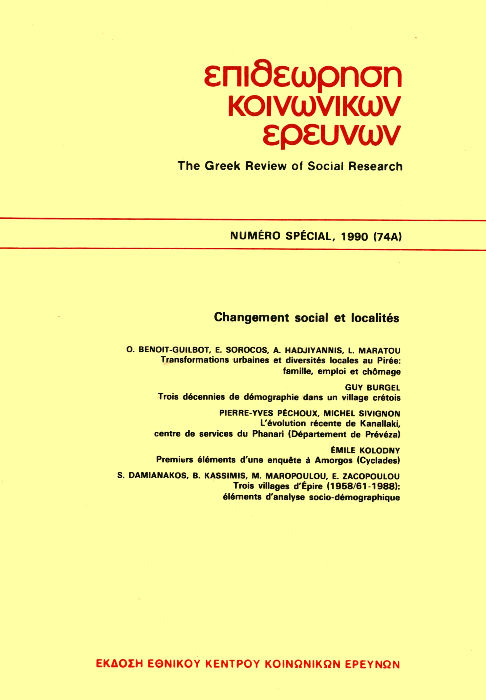Neokaisaria (Pieria): A case study of recent mass migration from western Macedonia to federal Germany
Abstract
Amongst contemporary Greek migrations, migratory waves towards
West Germany can be distinguished by their recent and massive
character, their special function as a supply of· unskilled industrial
manpower, as well as their precise geographical origins. Most of those
migrants came from Macedonia, a region united to Greece after the
first Balkan War (1912). The population of this area was fundamen
tally altered by the Greek-Turkish compulsory exchanges of 1922-23
and the arrival of numerous refugees from Asia Minor.
Neokaisaria, a small settlement near Katerini (Pieria), was founded
in 1928 by refugees from the Pontus mountains. Since 1961, the
village has lost half of its inhabitants through mass migration to West
Germany. Between 1975 and 1977, a parallel survey has been carried
out in Neokaisaria and in the Stuttgart conurbanization area, where
these migrants are mainly concentrated. This study is based on the
analysis of basic documents, Greek and German unpublished sources,
and matched from interviews on individuals. The Neokaisaria case
study offers a concrete example of today migratory movements in
rural Macedonia. This monography is an outcome of a more general
geographical project conducted by the French National Center for
Scientific Research K NRS RCP n° 397), dealing with labour migra
tions between Mediterranean countries and West Germany.
Article Details
- How to Cite
-
Kolodny, E. (1981). Neokaisaria (Pieria): A case study of recent mass migration from western Macedonia to federal Germany. The Greek Review of Social Research, 18–31. https://doi.org/10.12681/grsr.545
- Issue
- 1981: Numero Special
- Section
- Articles

This work is licensed under a Creative Commons Attribution-NonCommercial 4.0 International License.
Authors who publish with this journal agree to the following terms:
- Authors retain copyright and grant the journal right of first publication with the work simultaneously licensed under a Creative Commons Attribution Non-Commercial License that allows others to share the work with an acknowledgement of the work's authorship and initial publication in this journal.
- Authors are able to enter into separate, additional contractual arrangements for the non-exclusive distribution of the journal's published version of the work (e.g. post it to an institutional repository or publish it in a book), with an acknowledgement of its initial publication in this journal.
- Authors are permitted and encouraged to post their work online (preferably in institutional repositories or on their website) prior to and during the submission process, as it can lead to productive exchanges, as well as earlier and greater citation of published work (See The Effect of Open Access).





